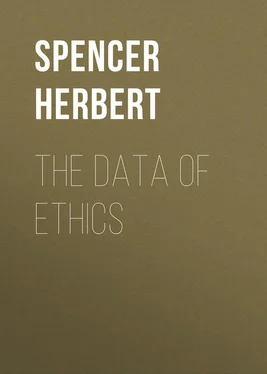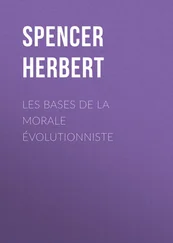Herbert Spencer - The Data of Ethics
Здесь есть возможность читать онлайн «Herbert Spencer - The Data of Ethics» — ознакомительный отрывок электронной книги совершенно бесплатно, а после прочтения отрывка купить полную версию. В некоторых случаях можно слушать аудио, скачать через торрент в формате fb2 и присутствует краткое содержание. Жанр: Философия, foreign_antique, foreign_prose, на английском языке. Описание произведения, (предисловие) а так же отзывы посетителей доступны на портале библиотеки ЛибКат.
- Название:The Data of Ethics
- Автор:
- Жанр:
- Год:неизвестен
- ISBN:нет данных
- Рейтинг книги:4 / 5. Голосов: 1
-
Избранное:Добавить в избранное
- Отзывы:
-
Ваша оценка:
- 80
- 1
- 2
- 3
- 4
- 5
The Data of Ethics: краткое содержание, описание и аннотация
Предлагаем к чтению аннотацию, описание, краткое содержание или предисловие (зависит от того, что написал сам автор книги «The Data of Ethics»). Если вы не нашли необходимую информацию о книге — напишите в комментариях, мы постараемся отыскать её.
The Data of Ethics — читать онлайн ознакомительный отрывок
Ниже представлен текст книги, разбитый по страницам. Система сохранения места последней прочитанной страницы, позволяет с удобством читать онлайн бесплатно книгу «The Data of Ethics», без необходимости каждый раз заново искать на чём Вы остановились. Поставьте закладку, и сможете в любой момент перейти на страницу, на которой закончили чтение.
Интервал:
Закладка:
Nor is even this whole conceived with the needful fullness, so long as we think only of the conduct at present displayed around us. We have to include in our conception the less-developed conduct out of which this has arisen in course of time. We have to regard the conduct now shown us by creatures of all orders, as an outcome of the conduct which has brought life of every kind to its present height. And this is tantamount to saying that our preparatory step must be to study the evolution of conduct.
CHAPTER II.
THE EVOLUTION OF CONDUCT
§ 3. We have become quite familiar with the idea of an evolution of structures throughout the ascending types of animals. To a considerable degree we have become familiar with the thought that an evolution of functions has gone on pari passu with the evolution of structures. Now, advancing a step, we have to frame a conception of the evolution of conduct, as correlated with this evolution of structures and functions.
These three subjects are to be definitely distinguished. Obviously the facts comparative morphology sets forth, form a whole which, though it cannot be treated in general or in detail without taking into account facts belonging to comparative physiology, is essentially independent. No less clear is it that we may devote our attention exclusively to that progressive differentiation of functions, and combination of functions, which accompanies the development of structures – may say no more about the characters and connections of organs than is implied in describing their separate and joint actions. And the subject of conduct lies outside the subject of functions, if not as far as this lies outside the subject of structures, still, far enough to make it substantially separate. For those functions which are already variously compounded to achieve what we regard as single bodily acts, are endlessly recompounded to achieve that co-ordination of bodily acts which is known as conduct.
We are concerned with functions in the true sense, while we think of them as processes carried on within the body; and, without exceeding the limits of physiology, we may treat of their adjusted combinations, so long as these are regarded as parts of the vital consensus . If we observe how the lungs aërate the blood which the heart sends to them; how heart and lungs together supply aërated blood to the stomach, and so enable it to do its work; how these co-operate with sundry secreting and excreting glands to further digestion and to remove waste matter; and how all of them join to keep the brain in a fit condition for carrying on those actions which indirectly conduce to maintenance of the life at large; we are dealing with functions. Even when considering how parts that act directly on the environment – legs, arms, wings – perform their duties, we are still concerned with functions in that aspect of them constituting physiology, so long as we restrict our attention to internal processes, and to internal combinations of them.
But we enter on the subject of conduct when we begin to study such combinations among the actions of sensory and motor organs as are externally manifested. Suppose that instead of observing those contractions of muscles by which the optic axes are converged and the foci of the eyes adjusted (which is a portion of physiology), and that instead of observing the co-operation of other nerves, muscles and bones, by which a hand is moved to a particular place and the fingers closed (which is also a portion of physiology), we observe a weapon being seized by a hand under guidance of the eyes. We now pass from the thought of combined internal functions to the thought of combined external motions. Doubtless, if we could trace the cerebral processes which accompany these, we should find an inner physiological co-ordination corresponding with the outer co-ordination of actions. But this admission is consistent with the assertion, that when we ignore the internal combination and attend only to the external combination, we pass from a portion of physiology to a portion of conduct. For though it may be objected that the external combination instanced is too simple to be rightly included under the name conduct, yet a moment's thought shows that it is joined with what we call conduct by insensible gradations. Suppose the weapon seized is used to ward off a blow. Suppose a counter-blow is given. Suppose the aggressor runs and is chased. Suppose there comes a struggle and a handing him over to the police. Suppose there follow the many and varied acts constituting a prosecution. Obviously the initial adjustment of an act to an end, inseparable from the rest, must be included with them under the same general head; and obviously from this initial simple adjustment, having intrinsically no moral character, we pass by degrees to the most complex adjustments and to those on which moral judgments are passed.
Hence, excluding all internal co-ordinations, our subject here is the aggregate of all external co-ordinations; and this aggregate includes not only the simplest as well as the most complex performed by human beings, but also those performed by all inferior beings considered as less or more evolved.
§ 4. Already the question: What constitutes advance in the evolution of conduct, as we trace it up from the lowest types of living creatures to the highest? has been answered by implication. A few examples will now bring the answer into conspicuous relief.
We saw that conduct is distinguished from the totality of actions by excluding purposeless actions; but during evolution this distinction arises by degrees. In the very lowest creatures most of the movements from moment to moment made, have not more recognizable aims than have the struggles of an epileptic. An infusorium swims randomly about, determined in its course not by a perceived object to be pursued or escaped, but, apparently, by varying stimuli in its medium; and its acts, unadjusted in any appreciable way to ends, lead it now into contact with some nutritive substance which it absorbs, and now into the neighborhood of some creature by which it is swallowed and digested. Lacking those developed senses and motor powers which higher animals possess, ninety-nine in the hundred of these minute animals, severally living for but a few hours, disappear either by innutrition or by destruction. The conduct is constituted of actions so little adjusted to ends, that life continues only as long as the accidents of the environment are favorable. But when, among aquatic creatures, we observe one which, though still low in type, is much higher than the infusorium – say a rotifer – we see how, along with larger size, more developed structures, and greater power of combining functions, there goes an advance in conduct. We see how by its whirling cilia it sucks in as food these small animals moving around; how by its prehensile tail it fixes itself to some fit object; how by withdrawing its outer organs and contracting its body, it preserves itself from this or that injury from time to time threatened; and how thus, by better adjusting its own actions, it becomes less dependent on the actions going on around, and so preserves itself for a longer period.
A superior sub-kingdom, as the Mollusca, still better exemplifies this contrast. When we compare a low mollusc, such as a floating ascidian, with a high mollusc, such as a cephalopod, we are again shown that greater organic evolution is accompanied by more evolved conduct. At the mercy of every marine creature large enough to swallow it, and drifted about by currents which may chance to keep it at sea, or may chance to leave it fatally stranded, the ascidian displays but little adjustment of acts to ends in comparison with the cephalopod; which, now crawling over the beach, now exploring the rocky crevices, now swimming through the open water, now darting after a fish, now hiding itself from some larger animal in a cloud of ink, and using its suckered arms at one time for anchoring itself and at another for holding fast its prey; selects and combines and proportions its movements from minute to minute, so as to evade dangers which threaten, while utilizing chances of food which offer: so showing us varied activities which, in achieving special ends, achieve the general end of securing continuance of the activities.
Читать дальшеИнтервал:
Закладка:
Похожие книги на «The Data of Ethics»
Представляем Вашему вниманию похожие книги на «The Data of Ethics» списком для выбора. Мы отобрали схожую по названию и смыслу литературу в надежде предоставить читателям больше вариантов отыскать новые, интересные, ещё непрочитанные произведения.
Обсуждение, отзывы о книге «The Data of Ethics» и просто собственные мнения читателей. Оставьте ваши комментарии, напишите, что Вы думаете о произведении, его смысле или главных героях. Укажите что конкретно понравилось, а что нет, и почему Вы так считаете.












